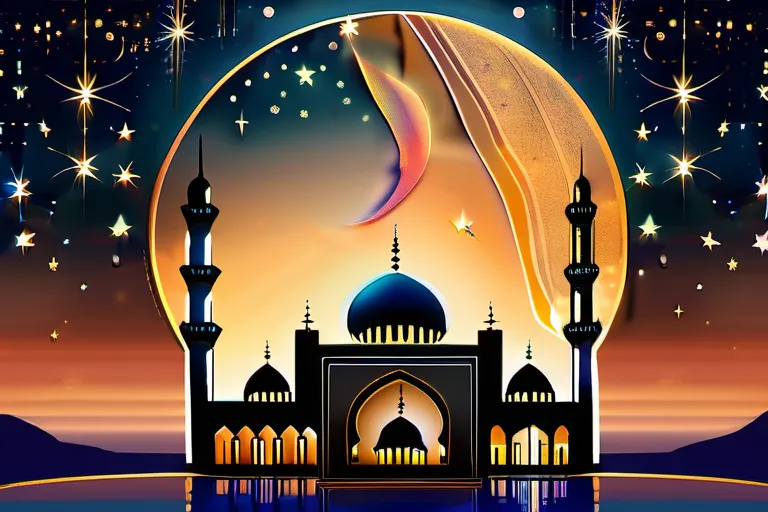Explore the Islamic perspective on eternal life, its significance, and the afterlife beliefs in this detailed guide.
Eternal life is a fundamental concept in many religions, and Islam is no exception. In this article, we delve into the Islamic understanding of eternal life, exploring its significance, the beliefs surrounding it, and the role it plays in the Islamic afterlife.
The Islamic Concept of Eternal Life
Imagine life as a river, flowing endlessly through time and space. In Islam, this metaphor takes on a profound meaning when discussing eternal life. The belief in eternal life is deeply rooted in Islamic teachings, which offer a vivid portrayal of existence beyond the physical world. How does this compare to other religions’ visions? Is there more to it than just death and oblivion?
The origins of this concept can be traced back to the Quran and the sayings of Prophet Muhammad (PBUH). According to Islamic teachings, eternal life is not merely a continuation of existence but a transformative journey. The soul, or nafs, is believed to live on after death, facing judgment before entering a state of eternal bliss or torment.
But what exactly defines these states? Is heaven a place of eternal rest and pleasure, or does it hold challenges that test one’s faith and character? Conversely, hell is often depicted as a place of endless suffering, yet even here there’s the potential for redemption. These concepts raise fascinating questions: Can the faithful truly understand the nature of paradise and hellfire until they experience them themselves?
In Islam, the afterlife is not just about rewards or punishments; it’s a reflection of one’s deeds in this life. The belief system emphasizes the importance of living a righteous life, as every action has consequences that echo into eternity. This perspective on eternal life serves as both a motivation for moral conduct and a reminder of the ultimate accountability we will face.
The Islamic Afterlife: Beliefs and Practices
The Islamic afterlife is often portrayed as a place of ultimate reward and punishment, where the faithful are judged based on their deeds in this life. Is it merely a concept to make believers behave ethically? Or does it hold deeper meanings for the soul’s eternal journey?
According to Islamic teachings, the soul continues its existence beyond death. The jannah, or paradise, and nar, or hell, are not just physical places but spiritual realms reflecting one’s actions and intentions on Earth. Imagine a place where your every good deed is like planting a seed that grows into eternal rewards; conversely, every evil act is akin to stunting the growth of others’ efforts in heaven.
The Day of Judgment, or Akhirah, symbolizes the final reckoning where all souls are judged. This event isn’t just a one-time occurrence but an ongoing process that reflects the continuous impact of our choices throughout life. It’s like watching a movie in slow motion, where every scene holds significance and consequences.
How you live your life—your intentions, actions, and interactions with others—shape this eternal existence. Are you planting seeds of compassion or cultivating weeds of greed? The Tariqat, or path to God, involves striving for righteousness and mercy. It’s a journey where each step brings us closer to understanding the true nature of our existence beyond the temporal world.
In this vast tapestry of Islamic beliefs, the afterlife isn’t just about ultimate rewards or punishments but about finding a purpose that transcends mortality. It’s like exploring an infinite library, where every book offers new insights into the eternal journey we are on. As believers navigate this life and beyond, the promise of eternal life serves as both a reminder and a motivation to live with integrity and compassion.
The Role of Good Deeds in Eternal Life
The Role of Good Deeds in Eternal Life: Explore the importance of good deeds in Islam and how they contribute to one’s eternal life.
Have you ever wondered what it means to have a good heart, or perhaps asked yourself if your actions truly make a difference beyond this lifetime? In Islam, the concept of good deeds is not just about performing acts of kindness; it’s a vital aspect that shapes one’s eternal life. Imagine the hereafter as a vast garden where every deed you have performed on earth is like a seed planted in fertile soil – each action bearing fruit in your ultimate destination.
In Islam, good deeds are seen as a bridge to Paradise (Jannah). They serve not only as moral guidelines but also as spiritual exercises that refine the soul. These acts can be as simple as offering a smile to someone in need or as complex as performing Hajj (the pilgrimage to Mecca). The key lies in the intention behind these actions – they should be motivated by seeking Allah’s pleasure, not just gaining recognition from others.
Imagine planting a tree; its roots must dig deep into the earth and its branches stretch towards the sky. Similarly, good deeds require effort and dedication but promise long-term benefits. They nourish the soul, making it stronger and more resilient against the trials of life. In essence, every righteous act is like adding another brick to the foundation of one’s eternal life in Paradise.
So, how can we ensure our actions contribute positively towards this eternal journey? By reflecting on our motivations and intentions, constantly seeking guidance through prayer and the study of the Quran, and by striving to emulate the qualities of the prophets and righteous people mentioned in Islamic texts. Each step taken with sincerity is a step closer to achieving a blessed life both here and beyond.
The Islamic Understanding of Resurrection
The Islamic understanding of resurrection is deeply intertwined with the concept of eternal life, casting light on the ultimate purpose and destiny of every individual soul. Imagine the moment when the trumpet sounds – a cataclysmic event that awakens all those who have ever lived, raising questions about what happens after this world fades away.
In Islam, resurrection is not just a theological concept but a promise of a new beginning. It signifies the ultimate accountability and the final judgment before God. How can we truly grasp the significance of this belief without considering its profound impact on our understanding of life and death?
The process of resurrection is described in vivid detail across Islamic texts, painting a picture where the dead are brought back to life to face their creator. This imagery serves as a powerful reminder that every moment, every action, and every word carries weight and significance – a metaphorical scale that will be weighed on Judgment Day.
So, why is resurrection so crucial in shaping one’s understanding of eternal life? It underscores the idea that our earthly existence is but a fleeting phase. Just as seeds buried in the soil await their moment to sprout, we too are promised this grand awakening – a rebirth into an eternal realm where justice and mercy coexist.
Through the belief in resurrection, Muslims find solace and motivation. It offers a perspective that extends beyond the boundaries of time and space, inviting us to reflect on our actions today as they will be judged in Eternity. This understanding not only shapes our beliefs but also guides our behavior – encouraging us to lead lives of righteousness and compassion.
How can we ignore this profound truth? The narrative of resurrection challenges us to live each day with purpose, to seek knowledge, and to strive for the betterment of ourselves and others. For in the end, it is not just our actions that are weighed but also our intentions – a subtle yet critical distinction that resonates deeply within the Islamic tradition.
The Impact of Eternal Life on Daily Life
The belief in eternal life plays a profound role in shaping the daily lives of Muslims, influencing their actions and values in ways that can often be subtle yet significant. How many times have you seen someone who seems to carry themselves with an added sense of purpose, as if each moment is not just a fleeting presence but part of something much larger? This could very well be the impact of believing in eternal life.
Imagine walking down a busy street, and seeing a stranger drop their phone. Would you stop to help? In a culture that values temporary existence over eternal significance, such acts might go unnoticed or even be considered bothersome. But for Muslims who see each day as a chance to prepare for the afterlife, such moments of kindness become not just an obligation but a sacred duty. The belief in eternal life transforms simple acts into opportunities for spiritual growth and a deeper connection with one’s Creator.
The impact is felt even more profoundly when one contemplates death. In many cultures, the thought of mortality can lead to anxiety or even despair. However, for Muslims, death is not just an end but a transition. It’s like a river that flows seamlessly from one bank to another, and each drop in the stream contributes to the life of the whole. This perspective encourages a sense of tranquility rather than fear, allowing individuals to live with purpose and contentment.
The daily practice of prayer (Salah), fasting during Ramadan, and performing good deeds become not just religious obligations but steps on the path towards eternal happiness. Each act is seen as a brick in the foundation of one’s future life, built layer by layer with each moment of kindness or devotion.
In this way, the belief in eternal life shapes the values and actions of Muslims, guiding them to prioritize honesty, charity, patience, and forgiveness. These virtues are not just abstract concepts but concrete steps towards living a fulfilling and meaningful existence that extends beyond the confines of this world.
So, as you go about your day, perhaps ask yourself: What small act can I perform today that will contribute to my journey towards eternal life? The answer might surprise you, revealing how deeply intertwined our daily lives are with the profound belief in eternal life.
Living a Virtuous Life for Eternal Happiness
How often do we find ourselves contemplating our actions and their impact on our eternal happiness? In Islam, living a virtuous life is not just about performing religious rituals; it’s about striving for spiritual growth and securing a place in Paradise. Is your daily routine aligned with the principles of Eternal Life in Islam? Reflect on this question: how many times have you chosen temporary pleasures over actions that could lead to everlasting happiness?
Imagine the journey towards eternal life as planting a tree. Each good deed is like sowing a seed, and the branches represent the rewards we will reap in the afterlife. But just as a tree requires care and nurturing, our efforts must be sincere and guided by faith. How can you ensure that your daily actions are not just routine but a reflection of your commitment to spiritual growth?
In Islam, the path to eternal happiness is paved with virtues such as honesty, kindness, charity, and patience. These virtues not only benefit others but also purify our souls. For instance, can you think of a time when you practiced patience during a difficult situation? How did it make you feel both spiritually and emotionally?
Remember that the journey towards eternal happiness is not about perfection but about continuous improvement. Every day presents an opportunity to grow closer to Allah. Set small, achievable goals in your daily life, such as performing extra prayers or engaging in acts of charity. These actions, though seemingly insignificant, contribute significantly to your spiritual well-being.
Lastly, always seek guidance from the Quran and Hadith for inspiration and direction. They provide a wealth of wisdom on how to live a virtuous life. How can you integrate these teachings into your daily routine?
Conclusion
 By gaining a deeper understanding of eternal life in Islam, we can appreciate the importance of living a virtuous life and striving for spiritual growth. This guide serves as a valuable resource for those seeking to learn more about this fascinating topic.
By gaining a deeper understanding of eternal life in Islam, we can appreciate the importance of living a virtuous life and striving for spiritual growth. This guide serves as a valuable resource for those seeking to learn more about this fascinating topic.











